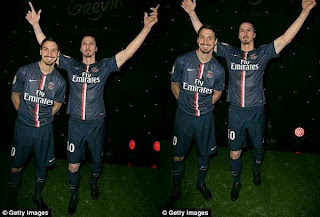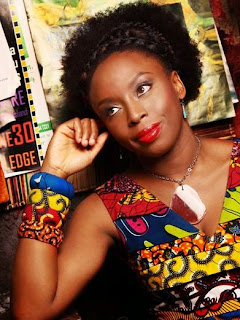Last week, Victor, a carpenter, came to my Lagos home to fix a broken chair. I asked him whom he preferred as Nigeria’s next president: the incumbent, Goodluck Jonathan, or his challenger, Muhammadu Buhari.
Victor sounded like many people I know: utterly unenthusiastic about the two major candidates in our upcoming election.
Were Nigerians to vote on likeability alone, Jonathan would win. He is mild-mannered and genially unsophisticated, with a conventional sense of humor. Buhari has a severe, ascetic air about him, a rigid uprightness; it is easy to imagine him in 1984, leading a military government whose soldiers routinely beat up civil servants.
Neither candidate is articulate. Jonathan is given to rambling; his unscripted speeches leave listeners vaguely confused. Buhari is thick-tongued, his words difficult to decipher. In public appearances, he seems uncomfortable not only with the melodrama of campaigning but also with the very idea of it.
To be a democratic candidate is to implore and persuade, and his demeanor suggests a man who is not at ease with amiable consensus. Still, he is no stranger to campaigns. This is his third run as a presidential candidate; the last time, in 2011, he lost to Jonathan.
This time, Buhari’s prospects are better. Jonathan is widely perceived as ineffectual, and the clearest example, which has eclipsed his entire presidency, is his response to Boko Haram. Such a barbaric Islamist insurgency would challenge any government.
But while Boko Haram bombed and butchered, Jonathan seemed frozen in a confused, tone-deaf inaction. Conflicting stories emerged of an ill-equipped army, of a corrupt military leadership, of northern elites sponsoring Boko Haram, and even of the government itself sponsoring Boko Haram.
Jonathan floated to power, unprepared, on a serendipitous cloud. He was a deputy governor of Bayelsa state who became governor when his corrupt boss was forced to quit. Chosen as vice president because powerbrokers considered him the most harmless option from southern Nigeria, he became president when his northern boss died in office.
Nigerians gave him their goodwill—he seemed refreshingly unassuming—but there were powerful forces who wanted him out, largely because he was a southerner, and it was supposed to be the north’s ‘turn’ to occupy the presidential office.
And so the provincial outsider suddenly thrust onto the throne, blinking in the chaotic glare of competing interests, surrounded by a small band of sycophants, startled by the hostility of his traducers, became paranoid. He was slow to act, distrustful and diffident. His mildness came across as cluelessness. His response to criticism calcified to a single theme: His enemies were out to get him.
When the Chibok girls were kidnapped, he and his team seemed at first to believe that it was a fraud organized by his enemies to embarrass him. His politics of defensiveness made it difficult to sell his genuine successes, such as his focus on the long-neglected agricultural sector and infrastructure projects. His spokespeople alleged endless conspiracy theories, compared him to Jesus Christ, and generally kept him entombed in his own sense of victimhood.
The delusions of Buhari’s spokespeople are better packaged, and obviously free of incumbency’s crippling weight. They blame Jonathan for everything that is wrong with Nigeria, even the most multifarious, ancient knots. They dismiss references to Buhari’s past military leadership, and couch their willful refusal in the language of ‘change,’ as though Buhari, by representing change from Jonathan, has also taken on an ahistorical saintliness.
I remember the Buhari years as a blur of bleakness. I remember my mother bringing home sad rations of tinned milk, otherwise known as “essential commodities”—the consequences of Buhari’s economic policy.
I remember air thick with fear, civil servants made to do frog jumps for being late to work, journalists imprisoned, Nigerians flogged for not standing in line, a political vision that cast citizens as recalcitrant beasts to be whipped into shape.
Buhari’s greatest source of appeal is that he is widely perceived as non-corrupt. Nigerians have been told how little money he has, how spare his lifestyle is. But to sell the idea of an incorruptible candidate who will fight corruption is to rely on the disingenuous trope that Buhari is not his party.
Like Jonathan’s People’s Democratic Party, Buhari’s All Progressives Congress is stained with corruption, and its patrons have a checkered history of exploitative participation in governance. Buhari’s team is counting on the strength of his perceived personal integrity: his image as a good guy forced by realpolitik to hold hands with the bad guys, who will be shaken off after his victory.
In my ancestral home state of Anambra, where Jonathan is generally liked, the stronger force at play is a distrust of Buhari, partly borne of memories of his military rule, and partly borne of his reputation, among some Christians, as a Muslim fundamentalist. When I asked a relative whom she would vote for, she said, “Jonathan of course. Am I crazy to vote for Buhari so that Nigeria will become a sharia country?”
Nigeria has predictable voting patterns, as all democratic countries do. Buhari can expect support from large swaths of the core north, and Jonathan from southern states. Region and religion are potent forces here. Vice presidents are carefully picked with these factors in mind: Buhari’s is a southwestern Christian and Jonathan’s is a northern Muslim.
But it is not so simple. There are non-northerners who would ordinarily balk at voting for a ‘northerner’ but who support Buhari because he can presumably fight corruption. There are northern supporters of Jonathan who are not part of the region’s Christian minorities.
Last week, I was indifferent about the elections, tired of television commercials and contrived controversies. There were rumors that the election, which was scheduled for February 14, would be postponed, but there always are; our political space is a lair of conspiracies. I was uninterested in the apocalyptic predictions. Nigeria was not imploding.
We had crossed this crossroads before, we were merely electing a president in an election bereft of inspiration. And the existence of a real opposition party that might very well win was a sign of progress in our young democracy.
Then, on Saturday, the elections were delayed for six weeks. Nigeria’s security agencies, we were told, would not be available to secure the elections because they would be fighting Boko Haram and needed at least another month and a half to do so. (Nigeria has been fighting Boko Haram for five years, and military leaders recently claimed to be ready for the elections.)
Even if the reason were not so absurd, Nigerians are politically astute enough to know that the postponement has nothing to do with security. It is a flailing act of desperation from an incumbent terrified of losing. There are fears of further postponements, of ploys to illegally extend Jonathan’s term.
In a country with the specter of a military coup always hanging over it, the consequences could be dangerous. My indifference has turned to anger. What a staggeringly self-serving act of contempt for Nigerians. It has cast, at least for the next six weeks, the darkest possible shroud over our democracy: uncertainty.









